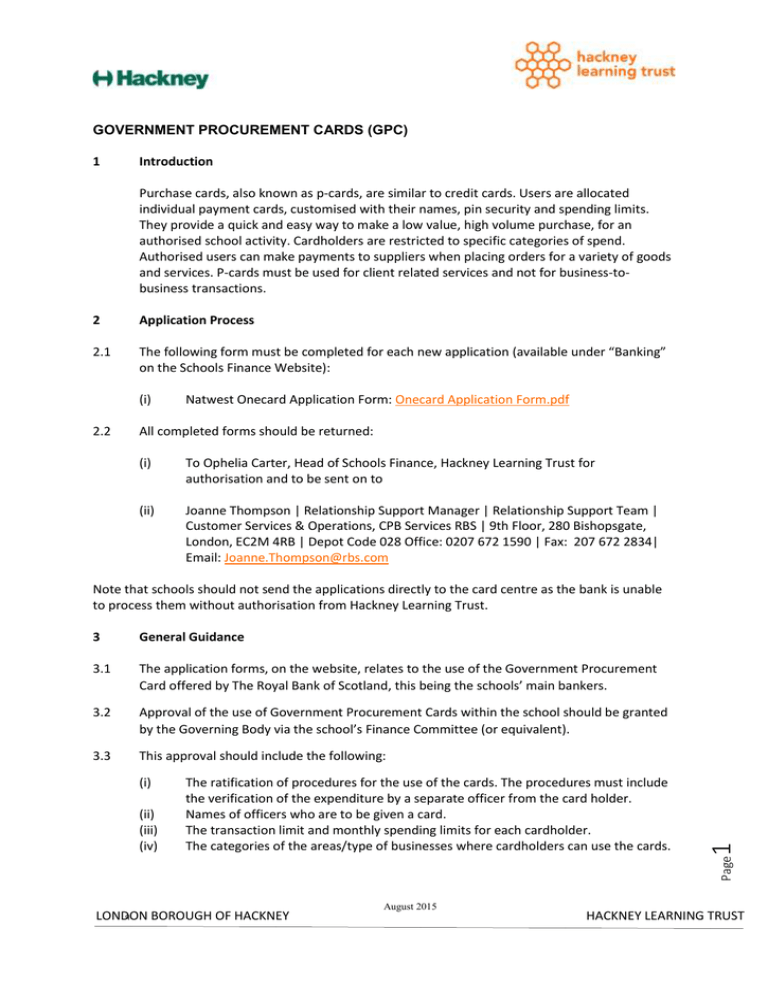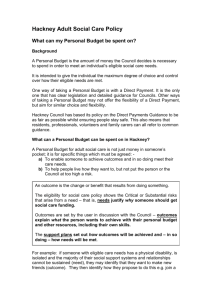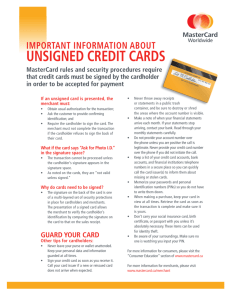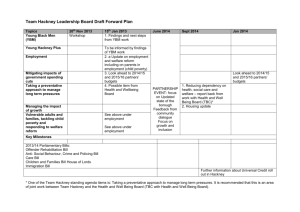HLT eProcurement Cards Guidance
advertisement

GOVERNMENT PROCUREMENT CARDS (GPC) 1 Introduction Purchase cards, also known as p-cards, are similar to credit cards. Users are allocated individual payment cards, customised with their names, pin security and spending limits. They provide a quick and easy way to make a low value, high volume purchase, for an authorised school activity. Cardholders are restricted to specific categories of spend. Authorised users can make payments to suppliers when placing orders for a variety of goods and services. P-cards must be used for client related services and not for business-tobusiness transactions. 2 Application Process 2.1 The following form must be completed for each new application (available under “Banking” on the Schools Finance Website): (i) 2.2 Natwest Onecard Application Form: Onecard Application Form.pdf All completed forms should be returned: (i) To Ophelia Carter, Head of Schools Finance, Hackney Learning Trust for authorisation and to be sent on to (ii) Joanne Thompson | Relationship Support Manager | Relationship Support Team | Customer Services & Operations, CPB Services RBS | 9th Floor, 280 Bishopsgate, London, EC2M 4RB | Depot Code 028 Office: 0207 672 1590 | Fax: 207 672 2834| Email: Joanne.Thompson@rbs.com 3 General Guidance 3.1 The application forms, on the website, relates to the use of the Government Procurement Card offered by The Royal Bank of Scotland, this being the schools’ main bankers. 3.2 Approval of the use of Government Procurement Cards within the school should be granted by the Governing Body via the school’s Finance Committee (or equivalent). 3.3 This approval should include the following: (i) Page (ii) (iii) (iv) The ratification of procedures for the use of the cards. The procedures must include the verification of the expenditure by a separate officer from the card holder. Names of officers who are to be given a card. The transaction limit and monthly spending limits for each cardholder. The categories of the areas/type of businesses where cardholders can use the cards. 1 Note that schools should not send the applications directly to the card centre as the bank is unable to process them without authorisation from Hackney Learning Trust. q LONDON BOROUGH OF HACKNEY August 2015 HACKNEY LEARNING TRUST 3.5 The p-card must operate by having a monthly direct debit set up to your local bank account to recover the full balance on the account. This will ensure that there are no outstanding amounts on the card at the end of the month. 3.6 Schools need to manage their cash flow to ensure budgetary provision and that they have sufficient funds available to pay off the monthly balance. 3.7 If a card holder should leave the school’s employment the card needs to be destroyed and the bank advised, via amendment form 8 (RBS Form 8) in order to cancel. A new application will need to be submitted, by way of an application form 2, if approval is granted to issue a card to another member of staff. 3.8 When purchases are made with the card, a VAT receipt must be obtained and passed to the school bursar/business/finance manager to enable monitoring of the account and for record keeping. The person entering the transactions and/or making payments, on the school’s system, should not usually be a cardholder. If an order is placed via the Internet, this must be printed and filed. If a telephone order is placed, a VAT receipt must be requested and a record made of the transaction until the receipt arrives (this should always be at the school’s address). 3.9 Each cardholder has a duty to ensure that all relevant documentation is received from suppliers, as the maintenance of adequate tax records is a statutory requirement. 3.10 The school must ensure there are adequate security measures in place for the holding of cards and for the prevention of fraud. It is important that adequate arrangements are in place to safeguard against unauthorised use. When not in use, cards should be kept in a safe. The following precautions are required by the cardholder: a) Sign the card immediately upon receipt b) Do not allow any other person to use the card (if the school plan to have multiple users, it is best to allocate them a card) c) Treat the card like cash - never leave it unattended e) Keep the card number, security code, PIN and personal details, secure f) If the card is lost or stolen, advice RBS immediately 3.11 Check that the supplier is able to accept card payment. An internal order form should be completed and approved in the normal way. A note must be made on the form that the card is to be used. 3.12 Ensure that your purchase is within your single transaction limit (including VAT and carriage charges) and that your monthly limit has not been exhausted. You must not split purchases to avoid the limits on your card. 3.13 In ordering goods/services from the supplier, ensure that you correctly quote your Government Procurement Card number and expiry date and confirm the total amount of the transaction with your supplier. 2 ATM or counter cash withdrawals cannot be obtained using p-cards. Page 3.4 q LONDON BOROUGH OF HACKNEY August 2015 HACKNEY LEARNING TRUST 3.14 Ask the suppler to send the VAT invoice/goods advice note (as applicable) directly to the school’s address 3.15 Ensure that the invoice is annotated “Paid by VISA”. 3.16 Segregation: The cardholder(s) must be a separate person from the individual responsible paying the invoice(s). 3.17 a) b) c) d) e) A Transaction Log must be maintained, which must be reconciled with monthly bank statement and receipts/invoices. Sample Transaction Log The monthly transaction log should be signed by the card holder’s Headteacher (or deputy) as certification that the required checks have been carried out and that the costs incurred are correct and approved. The monthly log should be sequentially numbered and passed to the Bursar with all supporting records for FMS update and reconciliation with the direct debit and statement. If the transaction log is completed by school finance staff receipts and details of transactions should be passed to finance on the next working day, after transaction, to facilitate accurate recording of school expenditure. The GPC reconciliation should be reviewed by an independent member of the Resource Committee or the Governing Body to ensure adequate oversight of GPC expenditure. The cardholder must ensure that all relevant documentation is received from suppliers. Remember the maintenance of adequate tax records is a statutory requirement on the LA/school. 3.19 On receipt of the statement, check that the details of each transaction correspond to adequate supporting documentation, i.e. requisition, order, delivery or receipts. Attach these to the statement, to maintain an audit trail. 3.20 Cardholders may not use personal loyalty cards (e.g. Nectar, Club-card etc.) in conjunction with the card. If any such use is made, it will give rise to a taxable benefit in kind which the individual will be liable for. 3.21 All paperwork is to be kept for 6 complete years. Page 3 3.18 q LONDON BOROUGH OF HACKNEY August 2015 HACKNEY LEARNING TRUST




